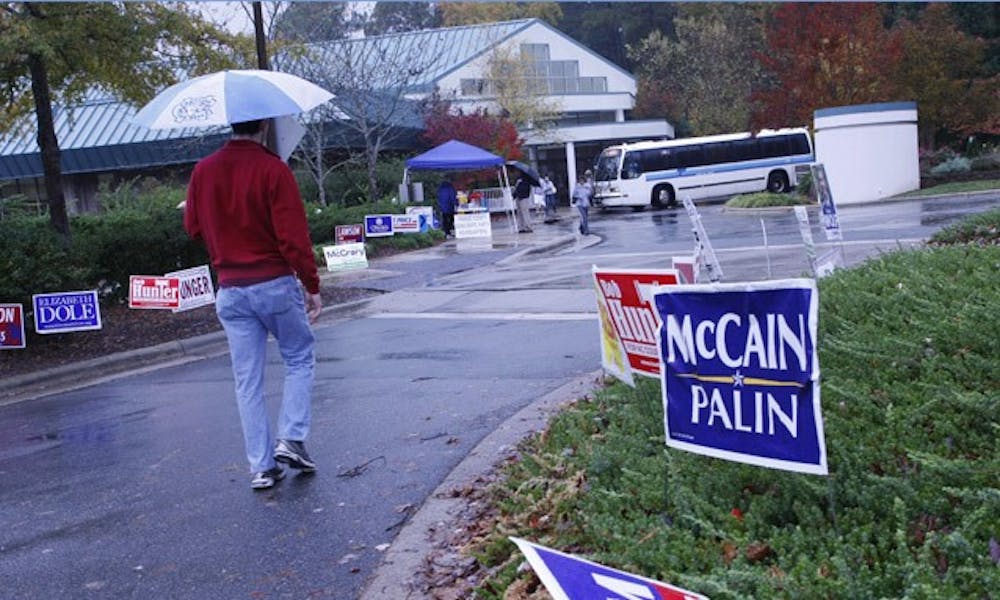As Duke’s voter turnout for presidential elections falls below the national average, some question whether or not the campus is politically active relative to its peer institutions.
According to a Chronicle analysis of data provided by the Durham County Government, 36 percent of students living on campus voted in the 2008 presidential election—compared to 51 percent of Americans ages 18 to 29 who voted in the same election. Within North Carolina, 55 percent of young people in the same demographic cast their votes, according to a 2009 report from the Center for Information and Research on Civic Learning and Engagement.
“As a campus, I would not characterize Duke as a highly politically engaged campus,” Dean of Students Sue Wasiolek said. “I would say that has been my experience since I have arrived in the early ’70s.”
Wasiolek noted that individual students’ political interests trump overarching campus political engagement. She attributed this to the fact that a college environment may create a disincentive for student voting because it creates an illusion that politics do not affect the individual.
“There are students, individually, who have a significant interest in the politics in this country,” Wasiolek said.
Several of Duke’s most politically active students noted that students may not vote in overwhelming numbers but demonstrate their interest in politically contentious issues in other ways.
Sophomore Daniel Strunk, a volunteer in Republican presidential candidate Mitt Romney’s campaign in North Carolina, works to establish Romney-oriented student groups on university campuses, including Duke. Strunk said the reason that the University’s voting figures are not robust is an issue of time and convenience.
“Students are incredibly busy,” Strunk said. “Competing for students’ attention and time is an extremely competitive marketplace, and this is none less so for political organizations and news networks.”
Nationally, voter turnout is on the rise. Young people have voted in increasing numbers since 1996, according to the Center for Information and Research on Civic Learning and Engagement report. The University is consistently unranked in The Princeton Review’s list of schools with the most politically active students. In contrast, institutions such as George Washington University, Georgetown University and University of Chicago are currently ranked in the top 10. Still, Strunk said there is no shortage of students who are invested in specific political issues. He said contentious topics such as gay marriage spark political conversation and engagement, but when it comes to holistic participation in politics, there is a lot of room for students to engage in a wider spectrum of issues.
A 2011 Chronicle survey asked students about their thoughts on several political issues. According to the survey, 85 percent of respondents said they believe same-sex couples should be allowed to marry, and 60 percent said they believe that, by law, a woman should be able to obtain an abortion as a matter of personal choice.
Co-President of Duke Democrats Elena Botella, a junior and a Chronicle columnist, also commented on the discrepancy between student interest in political issues and voter participation. Noting gender equality, income equality and lesbian, gay, bisexual and transgender rights as heated issues on campus, Botella said there is a long list of students groups whose core mission is functionally related to politics.
“Students are shifting their focus from simply looking into the issue to wondering if they have the opportunity to vote for a leader [who] will help them get their preferred policies enacted,” she said. “I think that gap and that myopia is starting to shift.”
Botella, who spearheaded the Duke the Vote project in tandem with the Duke Political Union last Fall, said that the goal of the project was to implement a system to make voting more convenient, adding that Duke’s political engagement ought to be reflected in its voter turnout. She added that she was impressed by the student turnout in the North Carolina municipal elections in November 2011, nothing that Duke Democrats registered 313 new voters this Fall.
“Elections are something that any reasonable Duke student can learn about and then engage in,” Botella said.
Freshman Adarsh Dave said he attributes the campus’ political quietness to the relative homogeneity of the student body.
“I find that most students I encounter here have similar backgrounds—a high-powered private or public high school education and an upper middle class socioeconomic situation,” Dave noted. “When a group of people is homogenous in nature, individuals are less radical in their beliefs, prompting less activism.”
Wasiolek said the current political theater is conducive to legislation concerning higher education.
“We tend to be less engaged in politics when we aren’t living where we think those politics are going to affect us,” she said. “The political landscape, particularly under the current economic conditions, suggests that there might be some large legislation on the horizon that could very much impact students in higher education. My hope is that students will get highly engaged in such elections.”
Get The Chronicle straight to your inbox
Signup for our weekly newsletter. Cancel at any time.

